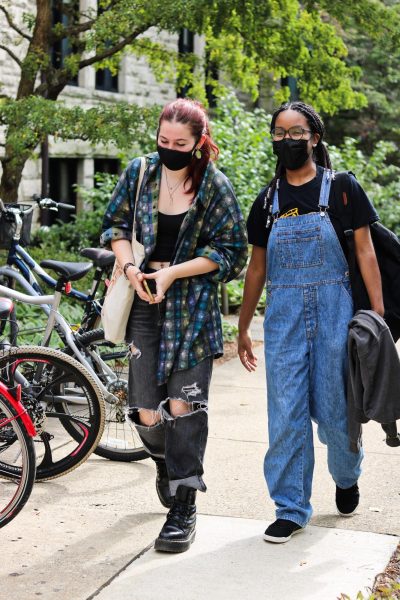Oberlin Students Must Evaluate Their Place in Local Elections
As critical midterm elections approach, Oberlin students need to again consider where and how we will vote. Many of us are transient residents both in Oberlin and Ohio more generally; thus, we need to think about what our role in these communities should be.
Consider Issue 11, which will be on Oberlin’s ballot this November. It’s the first phase of a levy that would consolidate Oberlin City Schools into a single building by 2025, increasing the tax burden of many Oberlin homeowners.
Because of its impact on local taxes, Issue 11 is highly controversial. Many Oberlin residents feel that their taxes are already too high, and that has driven people out of town in the past. A significant percentage of the city’s population is low-income, meaning that further tax increases could be financially devastating to some residents.
A group of residents have even come together in their opposition to Issue 11, forming a group called Oberlin Concerned Citizens, whose goal is to raise awareness about the levy’s potentially damaging effects.
At the same time, it is clear that district consolidation is, on some level, necessary. The district currently has four schools: Eastwood Elementary, Prospect Elementary, Langston Middle School, and Oberlin High School. It is unsustainable for a district with total enrollment of less than 1,000 students to maintain that amount of space.
Members of Oberlin Concerned Citizens say that the existing school population could be consolidated into some combination of the four existing buildings; however, the facilities are expensive to maintain, and the school board claims that sufficient renovation would be essentially as costly as the new building itself. The board also says that consolidating into a single building would ultimately save the district over $1 million a year.
Clearly, Issue 11 prompts nuanced and complicated conversations. It also centers around issues that simply do not affect most Oberlin students. Most of us do not pay property taxes to the city — nor does the College — and we do not use the public school system.
Issue 11 also appears on the ballot at a time when students have an already tumultuous relationship with the city. Many residents deeply disapprove of the way we handled the conflict with Gibson’s Bakery; if you drive around town, you can see many houses with “Support Gibson’s” signs in their yards. Further, many feel that the lack of tax revenue from students leaves an undue burden on residents.
For these reasons alone, Oberlin students should likely abstain from voting on Issue 11. While we each may have individual thoughts on the levy, we are not affected by its outcome. Obviously, students who are actually from the city are in a different position. However, why should the rest of us have a say in an issue that will have no effect on us?
Since coming to Oberlin, I have felt strange about voting on city issues. I do not feel that I fully understand local politics, nor do I have an adequate understanding of the issues that affect full-time residents. I did not vote in the City Council elections last year, nor do I intend to vote for any city issues — including Issue 11 — in November.
I am simply a visitor in this town. Anything I vote on will, at the most, only affect me for the few years I live here, while it will impact full-time residents for years to come.
When I first came to Oberlin, I was excited to vote in Ohio because it’s a swing state. I voted here for the 2016 presidential election — an example of when I think it is justifiable for College students to vote in Ohio.
Midterm elections are more difficult to figure out. Our district deals with extremely complicated issues common in rural Midwest communities, including alarmingly high opioid overdose rates and high unemployment rates. These are not issues one can fully understand and knowledgeably vote on as a transient member of the district. Furthermore, midterms are much lower stakes than presidential elections. Because Ohio is a swing state in presidential elections and presidential elections are much more focused on national issues, it makes sense for many students who are from solid red or blue states to vote in Ohio instead.
However, midterm elections are meant to choose representatives for individual districts that will best represent the local communities’ specific issues. Thus, it does not make sense for students who do not live in Ohio to help make a decision about who should represent the district when many of us will already be gone by the time the next midterm rolls around. It may be very tempting for you to try to help oust a representative that you strongly disagree with. However, keep in mind that the representative of this district should represent the people who actually live here and that their lives will be directly affected by their performance in Congress. They should be the ones choosing who will best represent them.
As a Houston native, I have a different lived experience. I don’t really know what life is like in an area like Oberlin. I don’t know what the best answer is to solving the problems in this district, and do not have a deep understanding of what has or has not worked in the past.
For these reasons, I do not feel comfortable voting in the Ohio midterm elections and will be voting via absentee ballot in Texas instead. It would be disingenuous of me to deny that the Texas Senate race isn’t of particular interest to me. It’s an extremely important, heated, and close race at the moment and is a large part of the reason I am choosing to vote in Texas for midterms.
However, I would encourage all Oberlin students who are not from Ohio to truly consider where they are choosing to vote. Can you relate to the experiences of the members of our district? Do you honestly know what this community needs from its government? If you cannot truthfully answer these questions, your votes may be better spent in your home state and district. Let the people who live here elect the people that will be representing them for years to come. What you believe to be in their best interest may not actually ring true in the long run.




